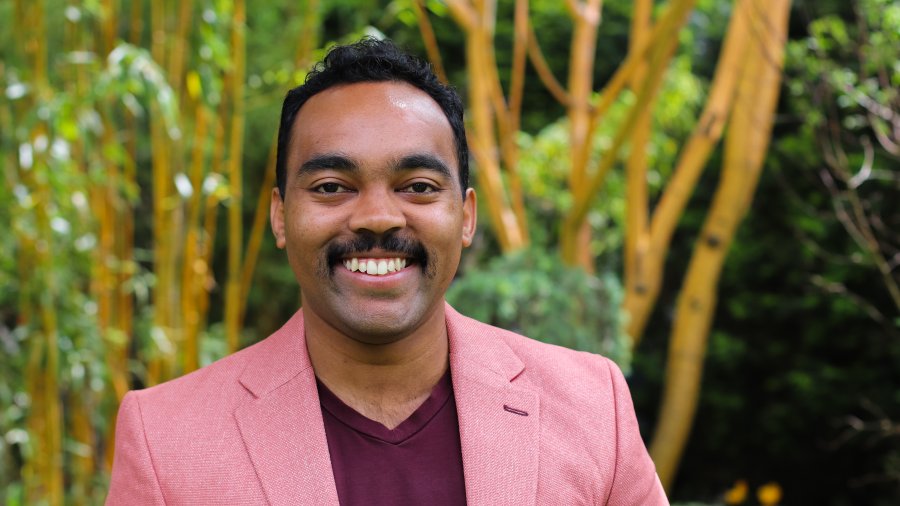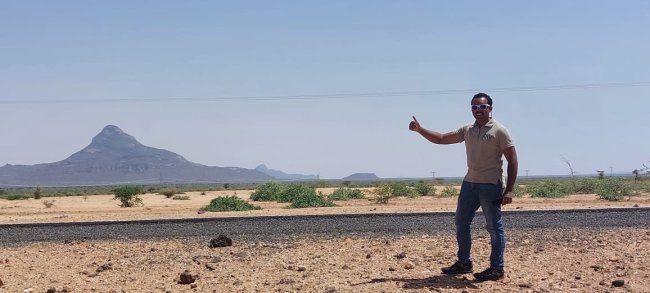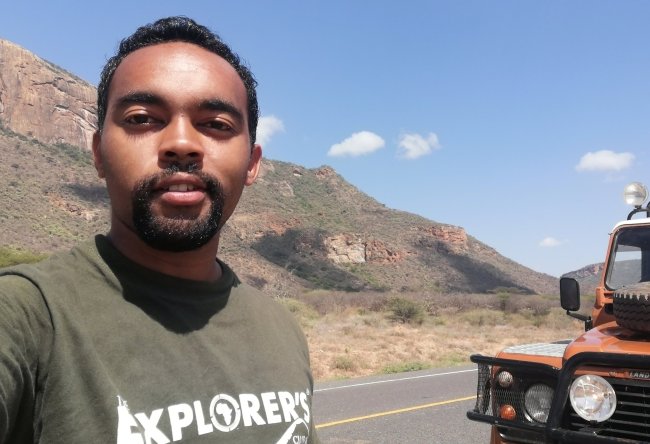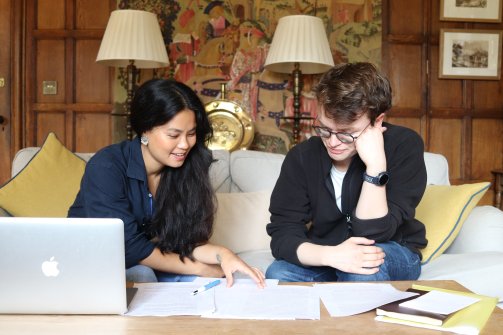The politics of time with Carolyn Smith


When Alberto Borges set off hitchhiking from his home in Nairobi at just 17, he had no idea that a single event on the trip would eventually lead him to Cambridge University as a Gates Scholar.

“I had read accounts of the early explorers to Marsabit,” says Alberto, MPhil student in Conservation Leadership, “and I wanted to see it for myself.”
Alberto had an instinct for adventure and discovery. Before he set off, his father had told him about black rocks in the Marsabit area that, once you broke them open, would yield agate crystals – so he made a vow that he would try to find them.
A week into his trip, after hitching a ride with a government worker, he stopped along a track in the searing heat, beside a sea of black rocks extending as far as the eye could see.
“I got out to take some photos of the rocks to show my father,” he says. “Just as I was taking the photos, a spider darted out from under the rock. That moment would be life-changing for me.”
Two weeks later, after his adventure had finished, Alberto was showing the photos to his father.
“My dad had a keen eye,” he says. “At one point, he stopped me – and pointed to the spider in the photo. He said he’d never seen a spider like that before – and that I should show the photo to the National Museums of Kenya.”
At the Museum, after hours of investigation, it turned out that Alberto had in fact found a new species of camel spider, also known as a sun spider.
“I was disappointed when they told me I had discovered a new species,” he says, “because I wanted to know what it was called!”
The Museum team then asked Alberto to take part in an expedition to find more examples of the spider. In order to participate, he secured a National Geographic Society grant to participate, aged just 18 – making him the youngest to be awarded a National Geographic grant since its inception in 1888.
The field trips would give Alberto more insight into the Marsabit region and he soon found himself interested, not simply in the spiders on the rocks (which he only ever glimpsed, very briefly, once more), but in the wider social, political, and environmental problems he discovered in the area.
“The descriptions of the Marsabit region I had read in the accounts of explorers, like Arthur Donaldson-Smith and even John Hillaby, depicted an ecologically rich environment,” he says. “That place was gone now – there was very little left from an ecological standpoint.”
Marsabit County – a large county around a third of the size of the UK, with a population of 500,000 – has suffered significantly in many areas because of climate change and unsustainable human interventions.
In the region Alberto found himself on expedition, there are around fourteen communities, some nomadic, some farming communities. Environmental challenges have pushed those communities into conflict with each other. There is conflict over water and land, livestock thefts, and armed fighting.
“I was getting exposed to the challenges facing these communities. Deforestation and drought, food and water shortages. I would see people walking 20 to 25km for water or for pasture."
“Habitat loss and droughts have also pushed wildlife into conflict with these human communities too,” says Alberto. “Recently, a woman and man were killed by an elephant looking for water, and later, a child was mauled by a hungry hyena.”
After these experiences, Alberto understood that he had embarked upon a new journey in his life.
“I realised then that my career would involve wildlife conservation and the promotion of sustainable human livelihoods,” he says.
Alberto's passion landed him a full scholarship to Catawba College for his Environmental and Sustainability undergrad studies. There, he began to focus more and more on the social, political, and ecological problems of the Marsabit area.
He worked up a plan to set up a Wilderness Conservation Centre in northern Kenya, to work with the local communities to help explore, research, and conserve the unique ecosystems there, and develop projects to help the communities.
“The idea is to create a hub on neutral territory,” he says, “to foster peace, and co-create the solutions to the problems that are causing so much tension and conflict; to leverage a system that would positively impact touchpoints in the area and have a ripple effect across the entire landscape.”
In order to make this happen, Alberto wanted to find a course that could help him better understand how to achieve his goal – and he found that in the University of Cambridge’s MPhil in Conservation Leadership, which he was able to pursue thanks to a prestigious Gates Cambridge Scholarship.
“Being a Gates Scholar – and getting to join the Conservation Leadership course at Cambridge – has made my goal clearer and more achievable,” he says. “The course provides a suite of resources and toolkits, so that I can really understand the wicked problem – or super-wicked problems – that Marsabit faces.
“I’ve had the opportunity to listen to over 60 conservation leaders from across the world on the course, to discuss my ideas with great people, and really develop the critical thinking about this big-scale problem in the region."
“What it’s given me is the tools to develop a theory of change, one that allows me to look at the whole system, and attempt to understand all of the wildlife, social, political, and legal constraints on the way to developing solutions.”
Alberto – who also founded The Explorers Club of Kenya – also found inspiration and direction for his project at Wolfson, with its Sustainability and Conservation Research Hub (S&C Hub).
The S&C Hub brings together Wolfson College students, staff, Fellows, and alumni, as well as others from across Cambridge University and beyond, to explore solutions to the destruction of the natural world.
“It’s great to be a part of the Hub,” he says, “and it’s really helped me to shape my plan. It gives you access to lots of people who have great ideas. I had one conversation in particular that made a big difference.”
Thanks to the help he has found on the Conservation Leadership course and the S&C Hub, Alberto is now much closer to bring his vision to reality. The next step is to raise funds for the project.
“We’re starting to build the website and set things up ready for investment and support,” he says. “It’s a very big project, one that will empower local communities, develop roles for leadership and education, and enhance digital capability in the region."
“I hope it will serve as a vital springboard for youth to learn and launch sustainable ventures, improving the lives of communities and the natural world.”
The need to support the Marsabit region is even greater given the lack of other organisations in the area, says Alberto.
“Not many conservation organisations choose to operate in the area, because of the conflict amongst the communities and the resulting security concerns,” he says.
And despite finding himself in some dangerous situations, Alberto feels well placed and willing to see his idea to the end.
“As a person who grew up in Nairobi to multi-racial parents, I don’t see tribal lines. And I’ve had the experience to understand what those different perspectives are in the region.
“It can be risky, but someone has to do it,” he says. “I guess you could say it is a calling.”
Read Alberto Borges’s profiles on the National Geographic website and the Gates Cambridge website.
You can find out more about the Wolfson Sustainability and Conservation Hub on their webpage.
And you can attend the next Wolfson sustainability event at Wolfson – Solutions to Plastic Pollution – today in the Gatsby Room, 5pm – 7pm.

Alberto was only 17 when he hitched his way to a new life

After Cambridge, Alberto will be back to Marsabit to set up the Wilderness Conservation Centre







